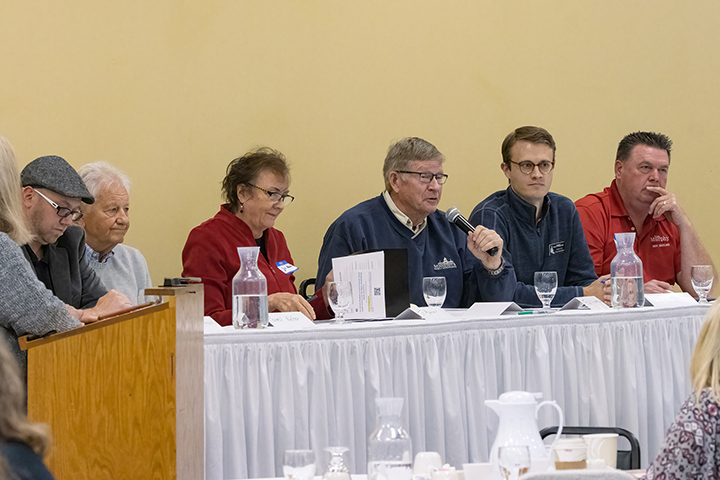Legislators, candidates gather for dialogue on mental illness
News | Published on October 24, 2022 at 12:07pm CDT

Suzette Sutton lived through most of 2018 as an unsheltered person while awaiting her disability application for mental and physical illnesses to be approved. Today, she is running a ministry for homeless individuals, but the journey to reach her current place of stability was difficult.
“I was living in my truck,” Sutton said, “living on $203 a month. It was scary. Panic attack after panic attack.”
Sutton, who was diagnosed with PTSD, high anxiety and social anxiety struggled to maintain a stable life and eventually applied for disability, but the process was lengthy. “I never know when a panic attack is going to come, so working is not an option for me,” she said.
Unable to work, she was forced to move out of her home and into the streets of Douglas County since she could no longer afford to pay rent. Sutton said that in Douglas County, as in many rural areas, there are no facilities where homeless individuals can stay while getting the help they need for mental health.
“Homelessness and mental illness often run hand-in-hand,” she said. “They are living in the woods; they are living in the Walmart parking lot…I lived there. I know their faces. I know who they are. I wish I could take all of them home with me now.”
Today, Suzette is living in her own apartment, managing her mental health, and helping others with similar lived experiences. But she wants to know how the Minnesota Legislature can address gaps in the adult mental health system of resources and find solutions for homeless individuals living with a mental illness.
Sutton was one of more than 90 people who gathered at the Broadway Ballroom Event Center in Alexandria recently to discuss issues surrounding mental health services in Minnesota and in the five-county region of Douglas, Grant, Pope, Stevens and Traverse. Included in the discussion were two Minnesota state legislators and four candidates for legislative seats. They spent the morning discussing the issues with attendees and listening to the personal stories of individuals whose lives have been affected, in some way, by mental illness.
The “11th Annual Day at Home in Region 4” event was sponsored by the Region 4 South Adult Mental Health Consortium. The annual gathering is designed to bring legislators and constituents together to engage in constructive dialogue on mental health issues, while putting a personal face on mental illness in the region. The event also provides a forum to educate participants on how to effectively interact with their legislators.
“Disability [approval] is a federal decision,” explained Sue Abderholden who moderated the dialogue. According to Abderholden, who is also the Executive Director of the National Alliance on Mental Illness – Minnesota, people awaiting that decision often have a mental illness and can wait years to get it approved.
“Meanwhile, they go on general assistance. For $200 or $300 a month you cannot rent any place,” she said.
“We also have shortages of affordable housing for people not battling any kind of mental illness. So, we have to increase affordable housing in general,” said Jeremy Vinar, DFL candidate for Minnesota House District 12B.
Vinar suggested solutions that included government partnering with private industry, expanding tax increment financing programs and using local government aid. Vinar also said that transitional housing would be critical as a “step out of homelessness, but not a permanent residence.”
“[It would be] something for them to get the care and advocacy they need to get back up on their feet and get into something more permanent.”
Representative Paul Anderson, R-Starbuck, affirmed the need in greater Minnesota for affordable housing. Anderson said it should be looked at from multiple angles, but also urged caution around spending at this time.
“We all know what’s happening with inflation,” Anderson said. “The cost of building is going up unbelievably. Interest rates have doubled in the last six months, so this is going to be a problem that is more difficult to handle than it was six months ago or a year ago.”
Crisis Stabilization Unit Funding
Another issue that came to the forefront of the conversation was the need to increase the number of crisis stabilization units in rural areas. Crisis Stabilization Units (CSU) are 24/7 programs within a residential facility where people experiencing a mental health crisis can stay for a short time, often ten days or less. They have support services to help people who do not require placement in the more restrictive behavioral health hospitals get back on their feet.
Sarah Richter, Crisis Program Manager for Region 4 South Adult Mental Health, said that the “closest crisis bed right now is in Fergus Falls. With that being four beds and covering a large area we are sometimes not able to access that.”
Attendee Kayla Schmidt described four separate crises she experienced in the past, two as a teen and two as an adult. Schmidt said that in each instance she was placed in a location an hour or more away from her family and her support networks, which caused her additional stress and difficulty. Schmidt, who now works as a Certified Peer Support Specialist providing support to others working through mental health challenges, asked the panel how the legislature can increase access to crisis beds closer to home communities.
“I’m asking that we look for funds for more crisis beds, to help with programming and to help with therapy while people are in this crisis situation,” Schmidt said.
Senator Jordan Rasmusson, R-Fergus Falls, reported that the mental health bill passed last session “almost doubled funding for small four bed crisis stabilization units.”
Rasmusson said that many four bed CSUs closed down around the state due to a reimbursement mechanism that provided less funding than they needed to operate. According to Rasmusson, he and Senator Ingebrightsen, R-Alexandria, championed the new rate mechanism that was passed through both the House and Senate which will allow more CSUs to open in greater Minnesota.
“I see the value in it,” Rasmusson said. “It keeps people out of the hospital, out of the emergency rooms, keeps people closer to their family and support networks. It is good clinical outcomes and cost effective from a state perspective. We have to continue building CSUs in greater Minnesota where we don’t have that access.”
“We are currently doing a needs assessment survey that includes crisis bed portion,” said Kesha Anderson-Trinka, Coordinator of Region 4 South Adult Mental Health Consortium. “So for our five counties we can determine the level of need for that. We will have that data available shortly.”
For more information about mental health issues in this region or to see video from the event, visit www.r4sconversations.org.




